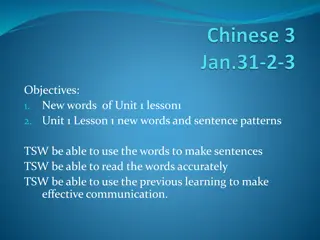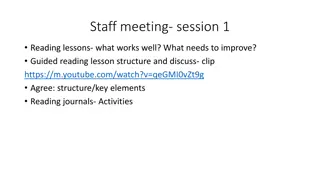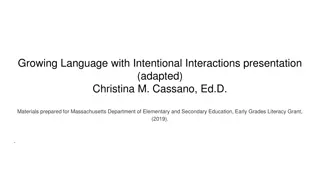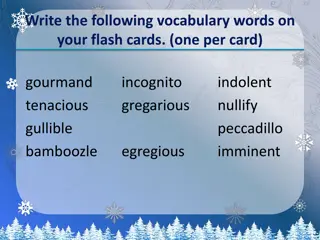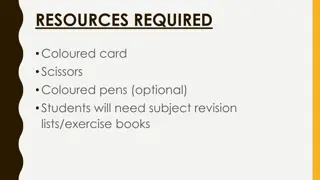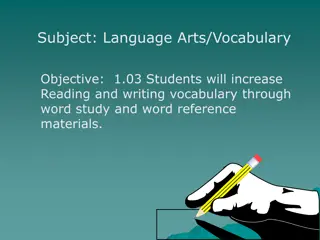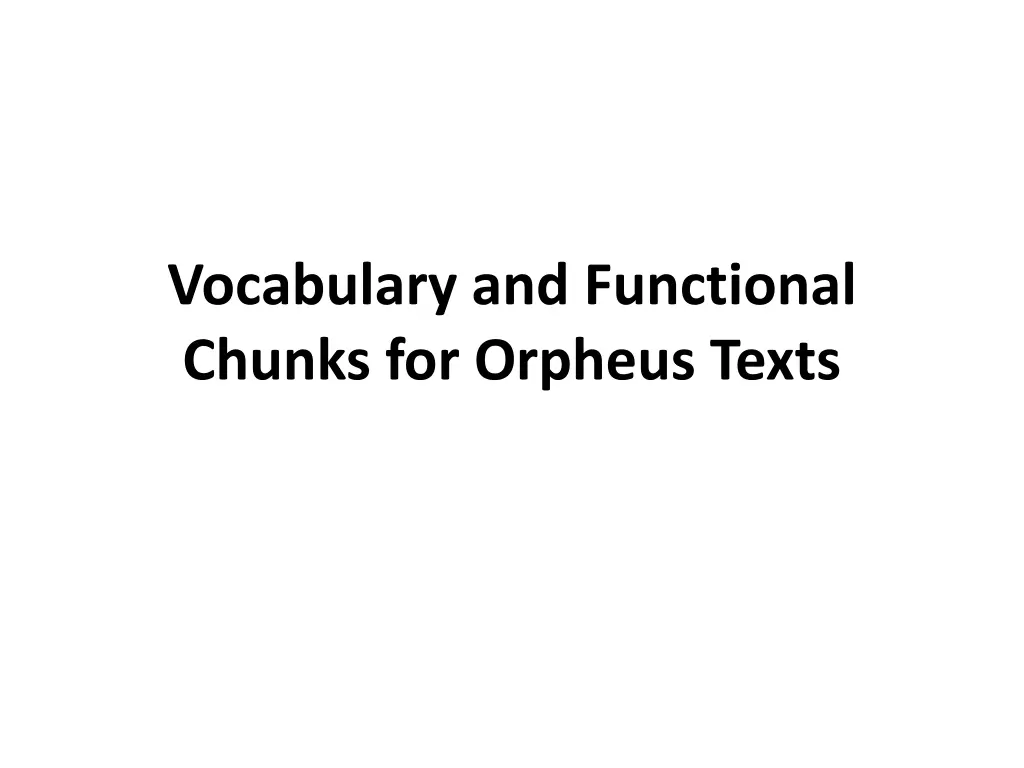
Vocabulary and Functional Chunks for Orpheus Texts
Explore a rich collection of vocabulary and functional chunks from Orpheus texts. Journey through expressions like "he stretched to the shores" and "eager of seeing" to enhance your understanding. Discover the meanings behind phrases such as "steep, dark, dense with shady mist" and "both stretching her arms and struggling." Delve into the language of Orpheus with this enlightening resource.
Download Presentation

Please find below an Image/Link to download the presentation.
The content on the website is provided AS IS for your information and personal use only. It may not be sold, licensed, or shared on other websites without obtaining consent from the author. If you encounter any issues during the download, it is possible that the publisher has removed the file from their server.
You are allowed to download the files provided on this website for personal or commercial use, subject to the condition that they are used lawfully. All files are the property of their respective owners.
The content on the website is provided AS IS for your information and personal use only. It may not be sold, licensed, or shared on other websites without obtaining consent from the author.
E N D
Presentation Transcript
Vocabulary and Functional Chunks for Orpheus Texts
ad oras tendit he stretched to the shores
ad Styga est ausus descedere he dared to descend to Styx Nota Bene: est ausus is perf
ad superas auras to the upper breezes
adfuit ille quidem that one indeed was present
an sit et hic dubito whether he is here I doubt Nota Bene: sit is pres subj of esse in ind quest
arduus, obscurus, caligine densus opaca steep, dark, dense with shady mist
aut citius sedem properamus ad unam or more quickly we hurry to one seat Nota Bene: citius is comp adv
avidusque videndi and eager of seeing Nota Bene: videndi is gerundive in gen
bracchiaque intendens prendique et prendere certans both stretching her arms and strggling to be taken hold of and to take hold of Nota Bene: intendens and certans both pres part; prendique is pass inf
causa viae est coniunx the cause of my path is my wife
crescentesque abstulit annos and he stole her increasing years Nota Bene: crescents is pres part acc pl
croceo velatus amictu having been covered with a yellow cloak Nota Bene: velatus is perf pass part
cura dolorque animi lacrimaeque alimenta fuere the care and grief od his soul and tears were his nourishment Nota Bene: fuere is syncopated fuerunt
exitus auspicio gravior the ruin was graver than the omen Nota Bene: was is understood; gravior is comp adj; auspicio is abl of comp
famaque si veteris non non est mentita rapinae and if the rumor of the old abduction is not a lie
fax lacrimoso stridula fumo usque fuit the torch was hissing straight on with tearful smoke Nota Bene: stridula is pred adj with fuit
flexit amans oculos the loving one bent his eyes
iamque iterum moriens and now dying again Nota Bene: moriens is pres part dep
in quam calcata venenum vipera diffudit into whom a viper having been stepped on poured venom Nota Bene: quam is acc after in implying motion; calcata is perf pass part
inde per inmensum aethera from that place through the immense upper air Nota Bene: aethera is Greek sing acc
nam nupta per herbas dum nova vagatur for while the new bride wanders through the grasses Nota Bene: vagatur is 3rd pers sing dep
ne deficeret metuens fearing lest she might let down Nota Bene: deficeret is imp subj in fearing clause; metuens is pres part nom
ne non temptaret et umbras lest he not even try the shades Nota Bene: temparet is imp subj in a neg purp clause
nec felix attulit omen he did not bring a lucky omen
nec laetos vultus attulit he did not bring happy faces
nec me temptasse negabo nor will I deny that I had tried Nota Bene: temptasse is syncopated tempptavisse (past inf) in a ind statement with me as its acc subj
nec procul afuerunt telluris margine summae nor had they been far from the top of the earth s edge
nequiquam voce vocatur he is called by the voice in vain Nota Bene: vocatur is 3rd pers sing pres pass
nil nisi cedentes infelix arripit auras she unlucky snatches at nothing except the receding breezes Nota Bene: cedentes is pres part acc
non est de coniuge quicquam questa suo she has not complained anything about her own husband Nota Bene: est questa is perf act dep
non fallere putando to not be deceived by the thinking Nota Bene: putando is gerundive in abl
nullosque invenit motibus ignes and with it having been moved he found no fires Nota Bene: motibus is perf pass part in abl
occidit in talum serpentis dente receptor she dies with the tooth of a serpent having been received into her ankle Nota Bene: talum is acc after in implying motion; dente receptor is abl abs
omnia debemur vobis all of us are owed to you Nota Bene: debemur is 1st pers pl pres pass
orantem frustraque iterum transire volentem portitor arcuerat the ferryman had kept off the one begging in vain and wanting to cross again Nota Bene: orantem and volentem are both pres part acc; acuerat is pluperf ind
paulumque morati serius and having delayed for a short while later Nota Bene: morati is perf act part dep; serius is comp adv
per ego haec loca plena timoris oro I pray through these places full of fear Nota Bene: loca is acc pl neut
perque leves populos and through the light peoples
porrectaque bracchia veros esse putes ramos and you would have thought that the arms having been stretched out were true branches Nota Bene: esse is inf in ind state; putes is pres subj
posse pati volui I wanted to be able to suffer Nota Bene: pati is dep inf
properata retexite fata unweave the fates having been hurried Nota Bene: properata is perf pass part mod fata; retexite is imp
protinus illa relapsa est that one immediately slipped back Nota Bene: relapsa est is perf act dep
quam satis postquam deflevit vates and after the poet wept for her enough Nota Bene: quam=et illam (connecting relative)
quid enim nisi se quereretur amantam for what would she complain except her having been loved Nota Bene: quereretur is imp subj dep; amantam in pres part
quod iam vix auribus ille acciperet which that one now scarcely was receiving with his ears Nota Bene: acciperet is imp subj
revolutaque rursus eodem est and she was rolled back again to the same place Nota Bene: revoluta est is perf pass; place is understood
sed et hic tamen auguror esse But however I prophesize that he is here too Nota Bene: auguror is dep; he is understood with esse as inf in ind state
sed nec sollemnia verba attulit but he did not bring solemn words
septem tamen ille diebus in ripa Cereris sine munere sedit for seven days however that one sat on the riverbank without the gift of Ceres Nota Bene: septem diebus is abl of time within which rather than acc of dur which would be expected; Cereris is metonymy for grain

